In a heartwarming tale of redemption, six young lions, once purchased as status symbols and later abandoned, have embarked on a journey of transformation as they begin their new life at the ADI Wildlife Sanctuary in South Africa. Rescued from the illegal wildlife trade in Kuwait, these majestic creatures are now thriving in their natural habitat, thanks to the tireless efforts of dedicated individuals and organizations.



The lions – named Muheeb, Saham, Shujaa, Saif, Dhubiya, and Aziza – were cruelly discarded by their owners in the streets of Kuwait City or the desolate desert surroundings, where it is illegal to keep them as pets. Fortunately, the compassionate staff and volunteers at Kuwait Zoo intervened, recapturing the lions and providing them with temporary refuge.
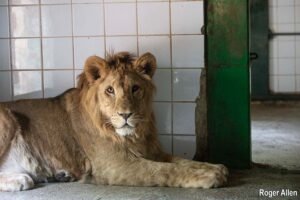
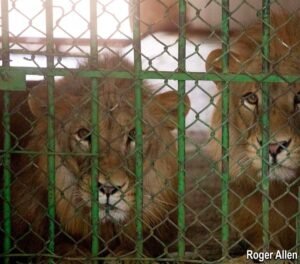



Jan Creamer, President of ADI said that “The Kuwait 6 lions have their whole lives ahead of them and will have acres of space at the ADI Wildlife Sanctuary. The ADI supporters who are helping to fund their care and this rescue are giving these lions their lives back, living as close as possible to the life they lost. This is great news for these lions but also a warning about a cruel and irresponsible trade. Lions should never be kept as pets; they are wild animals. ADI is grateful to the authorities in Kuwait for action to try and halt this illegal trade, to Kuwait Zoo for providing a safe haven for the lions, to Qatar Airways Cargo for helping bring them home, and to the ADI supporters funding the care of these animals.”
Animal Defenders International (ADI) stepped in to offer a permanent home for these vulnerable animals at their sprawling 455-acre sanctuary in South Africa. The sanctuary, nestled amidst the breathtaking landscapes of Free State, provides a safe haven where rescued wildlife can roam freely and thrive in their natural environment.
Mark Drusch, Chief Officer Cargo at Qatar Airways Cargo went on to say that “We are proud to once again be supporting ADI, this time in bringing these six beautiful lions home to Africa. Our WeQare Rewild the Planet initiative is our commitment to returning wildlife and endangered species back to their natural habitat, free of charge. It takes a lot of effort and logistics for our team to organise moving such large animals, but it is something we are all collectively very proud and passionate to be a part of.”
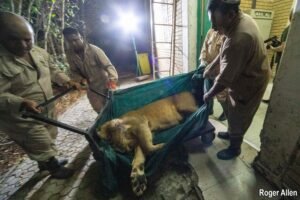


The journey to their new home was made possible through the generosity of Qatar Airways Cargo, which donated a special cargo flight as part of their WeQare scheme. Renowned wildlife veterinarian Dr. Peter Caldwell oversaw the lions’ welfare throughout the relocation process, ensuring their safety and comfort during the journey.
Upon arrival at the ADI Wildlife Sanctuary, the lions were initially housed in night shelters before being released into quarantine enclosures. Here, they are given ample space to roam and play, with enrichment activities such as catnip punchbags and giant balls to stimulate their natural instincts.
The story of the “Kuwait 6” sheds light on the dark underbelly of the illegal wildlife trade, where animals are exploited for profit and discarded like commodities. Often torn from their mothers at a young age, these creatures are subjected to a life of loneliness and confinement, deprived of their natural habitat and instincts.
Used as status symbols by their owners, lions like Muheeb, Saham, and the others face a bleak future once they outgrow their appeal. As they mature, their needs become increasingly challenging to meet, leading to their abandonment and neglect.
ADI warns of the dangers of promoting big cat ownership as a trendy fad, highlighting the potential consequences of a burgeoning epidemic of discarded lions and tigers worldwide. Without decisive action to curb the demand for exotic pets and combat illegal wildlife trafficking, the plight of these magnificent creatures will continue to escalate.
Alzahra Aljanabi, Senior Translator, Animal Welfare Department, Public Authority of Agricultural Affairs and Fish Resources said that“The Public Authority of Agriculture and Fish Resources and Kuwait Zoo would like to thank the ADI Wildlife Sanctuary for their support and efforts in providing a better habitat for the six lions from Kuwait. We are also thankful for Qatar Airways Cargo for funding the flight, Royal Animal Hospital, Bahman International Cargo, Kuwait Zoo staff and Leila (@bfgkuwait). People underestimate the risks of having wild animals as pets. They may be magnificent creatures, but they are also predators. We need more awareness to combat wildlife trafficking”.
Through the collective efforts of organizations like ADI and the compassion of individuals who refuse to turn a blind eye to animal suffering, lions like Muheeb and his companions have been given a second chance at life. As they roam the vast plains of South Africa, they serve as ambassadors for their species, reminding us of the importance of protecting and preserving the natural world for future generations.
Creamer ended by saying that “Seeing these lions playing as they start their new lives at the ADI Wildlife Sanctuary is magical and we are excited to see them start to explore their large habitats. It is also a reminder of how much work needs to be done to stop the suffering of others like them and to defeat the wildlife traffickers. I hope that people will join ADI as we work for that goal.”
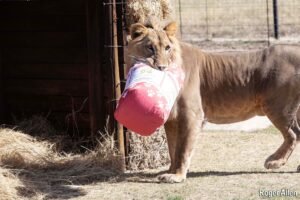

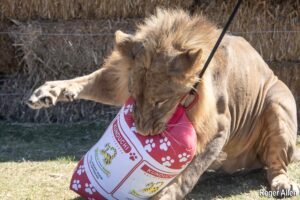
To find out more and help care for the Kuwait 6 lions visit: https://adiwildlifesanctuary.org.za. And, to learn about the ADI, they are behind some of the biggest and most dangerous large scale animal rescues in the world, with daring undercover missions to expose the suffering of animals.
Active worldwide to end animal suffering, ADI’s undercover investigations inside laboratories, circuses, animal traffickers, and Hollywood animal trainers, have led to prosecutions and new laws to protect animals.
Bans on all or wild animals, in circuses have been secured in 50 countries. In Bolivia, Peru, Colombia, and Guatemala, ADI has assisted government wildlife officials enforce the bans and empty the cages. ADI has helped enforce circus bans in Bolivia, Peru, Colombia, and Guatemala emptying all of the cages, saving lions, tigers, bears, monkeys, and many other animals. Relocations of these animals include airlifts of 33, 25, and 17 lions and tigers, and 40 monkeys at a time.
ADI cares for their lion and tiger circus survivors in their 455-acre sanctuary in South Africa, where lions and tigers roam huge natural enclosures – enjoying their freedom and as close to their natural life as possible for these abused animals.
Learn more about lions and the illegal activities surrounding trophy hunting, as well as the importance of allowing lions to stay in their own natural habitat. Click here!


